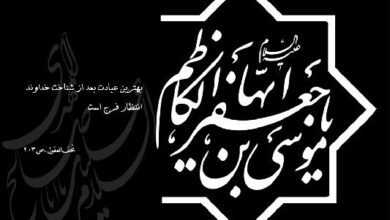The Life Of 5th Imam : Imam Baqir As

Muhammad ibn ‘Ali al-Baqir (Peace be Upon him)
Name: Muhammad.
Title: al-Baqir.
Agnomen: Abu Ja’far.
Father’s name: ‘Ali Zaynu ‘l-‘Abidin.
Mother’s name: Fatimah bint al-Hasan, known as Umm Abdillah.
Birth: In Medina, on Tuesday, 1st Rajab 57 AH.
Shahadat : at the age of 57, in Medina on Monday, 7th Dhi’l-hijjah 114 AH; poisoned by Hisham ibn ‘Abdi ‘l-Malik; buried in Jannatu ‘l-Baqi ‘, in Medina.
The 5th Holy Imam Hazrat Muhammad Baqir (as)
The birth of Imam Baqir (as) took place in Medina on the first of Rajab or the third of Safar, 57 A.H. He traced his ancestry back to Hazart-e Ali (as) and Fatima Zahra (Sa) on both his mother’s and father’s sides. Imam Sadiq (as) once said that her beloved mother was one of a kind in the household of Imam Hassan. The Fifth Apostolic Imam is the holy Imam Muhammad al-Baqir. Abu Ja’far was his kunniat, and most people called him “al-Baqir.” His mother was Imam Hasan’s daughter. So, he was the only Imam who was related to Hadrat Fatimatu’z-Zahra both through his father and his mother
Timeframe of Imam Baqir (as)
There are two distinct time frames for Imam Baqir’s (Pbuh) reign. His father, Hazrat-e Ali -Ibn-al-Hossain (Pbuh), led the Muslim community for more than 35 years before the establishment of the Imamate. During the second half of his life, Imam served as leader. His scientific administration was established at this time. He taught in religious universities for fifty years, during which time he imparted the truth of the faith to his students and chronicled the one hundred years of Islamic history from the time of Hazrat-e Mohammad’s (SW) death until his own.
Imam Baqir (as) legitimacy as an Imamate
The story of how the Twelve Imams (Pbuh) were first introduced, as told by Hazrat-e Mohammad (SW).The unique story that Hazrat-e Mohammad (SW) told about Imam Mohammad Baqir (Pbuh).
Third, the testimony of Jabir Ibn-Abdollah Ansari on the prophet’s (SW) announcement of Imam Mohammad Baqir’s (Pbuh) birth.The declaration of Imamate by Imam Sajad (Pbuh) for Hazrat-e Baqir (Pbuh). The Hazrat’s self-promotional remarks and his vow to see the Imamate through to the 12th Imam.
Imam Baqir (as) involvement in politics and society
Baniomayeh’s feeble rule was overthrown by Baniabbas because of the increasing popularity of Imam Hossein (Pbuh) and the oppression of the Omavid regime. This was an ideal chance for Imam Baqir (Pbuh) to advance Shi’ite Islam, discredit occult practises, and advocate for the correct application of divine law.
Early years of Imam Baqir as
Imam Muhammad al-Baqir spent three years being cared for by his grandfather, Imam Hussain. He was taken care of by his father, ‘Ali Zaynu’l-‘Abidin, for thirty-four years. The Holy Imam was in Karbala’ when his grandfather, Imam Husayn, and his friends were brutally killed in front of him and their friends.
He also went through the same things as his father and the women of the House of the Prophet (Ahlu’l-Bayt): cruel capture and imprisonment at the hands of Yazid ibn Mu’awiyah’s wicked forces. After the terrible events of Karbala, the Imam lived in peace in Medina, where he prayed to Allah and led people in the right direction. Since Yazid, the son of Mu’awiyah, killed Imam Husayn, the Umayyads began to fall apart. Even though Yazid only ruled for a short time, he was already fully aware of how bad his actions were.
The noble character of Imam Baqir (as)
His second son, Mu’awiyah, refused to take the caliphate. He said, “I cannot support a throne that has been built on abuse and tyranny.” Ibn Hajar al-Haytami, a famous thinker from the Sunnite School, says, “Imam Muhammad al-Baqir has revealed the secrets of knowledge and wisdom and laid out the rules for spiritual and religious direction.
No one can question high character of Imam Baqir (as), the knowledge and wisdom that God gave him, or his sense of duty and gratitude to share knowledge. He was a holy and very skilled spiritual leader, which is why people called him al-Baqir, which means “the giver of knowledge.” The Imam Baqir (as) had a kind heart, was perfect in every way, had a holy soul, and was a good person. Imam Baqir (as) spent all of his time submitting to Allah and spreading the lessons of the Holy Prophet and his descendants.
The Imam Baqir (as) left so much information and direction in the hearts of the faithful that it is impossible for a man to count it. His sayings about loyalty and abstinence, knowledge and wisdom, religious practice and submission to Allah are so many that this book isn’t big enough to hold them all. (as-Sawa’iqu ‘I-muhriqah, p. 120)
The Knowledge of Imam Baqir and contribution in science
The Holy Imam Baqir (as) was able to write down the lessons and changes made by the Holy Prophet and his Ahlul-Bayt. Under his direction, his students put together books about different areas of science and art. The Holy Imam Muhammad al-Baqir was like the Holy Prophet and his great grandfather, ‘Ali ibn Abi Talib, in how good he was as a person and how godly he was.
Imam Baqir as words of advice stirred up a spiritual movement among Muslims in general. He was kind to everyone, even his worst enemies. He was also always telling them to do the right thing. He told people that they should work hard to make a living. The Holy Imam thought it was very important to hold majalis (meetings) to remember Imam Hussain’s martyrdom.
Imam Baqir (as) started the tradition of Majalis
In these majalis, one of the most famous and skilled writers of the time, Kumayt ibn Zayd al-Asadi, would read the elegy of Imam Hussein. Imam Ja’far as-Sadiq and Imam ‘Ali ar-Rida, the Sixth and Eighth Imams, were also big fans of these kinds of majalis. Imam Muhammad al-Baqir preached calmly until the year 114AH. When he was 57 years old, on the 7th Dhi’l-hijjah, the king at the time, Hisham ibn ‘Abdi ‘I-Malik ibn Marwan, poisoned him to death. This Holy Imam’s funeral prayers were led by his son, Imam Ja’far as.-Sadiq, who was the Sixth Imam. His body was buried in Jannatu’l-Baqi’ in Medina.
Allamah Tabatabai writes about Imam Baqir (as)
Imam Muhammad ibn ‘Ali al-Baqir was born in 57/675. He was the son of the Fourth Imam. The Prophet gave him the title al-Baqir, which means “he who cuts and dissects.” He was four years old when the event of Karbala happened. He became Imam because God told him to and because the people who came before him said so. In the year 114/732, he died. Some Shiite beliefs say that Ibrahim ibn al-Walid ibn ‘Abdillah, the nephew of the Umayyad ruler Hisham, poisoned him.
During the time of the Fifth Imam, there were revolts and wars every day in some part of the Islamic world because of how unfair the Umayyads were. Also, there were fights within the Umayyad family, which kept the kingdom busy and, to some extent, left the Prophet’s family members alone. On the other hand, the tragedy of Karbala’ and the abuse of the Household of the Prophet, of which the Fourth Imam was the most famous example, had drawn many Muslims to the Imam.
The combination of these things made it possible for a lot of people, especially Shi’ites, to go to Medina and meet the Fifth Imam. The Fifth Imam gave ways to spread the truth about Islam and the sciences of the Household of the Prophet that none of the Imams before him had ever thought of. This is shown by the many stories told about the Fifth Imam and by the fact that he taught many famous scientists and Shi’ite teachers about different Islamic subjects.
There are books about great men in Islam that list these names. (Shi’ite Islam) Imam al-Baqir, peace be upon him, said that the highest level of perfection is greatness in understanding the faith, patience in hard times, and running one’s life in the right way for one’s means.
The teacher (‘alim) who benefits from his knowledge is better than seventy thousand followers (‘abid). One who doesn’t obey Allah doesn’t know Him.
The mission of Ima’m Abu’ Ja’far (al-Ba’qir), peace be on him, has been accomplished: the dissemination of Islamic culture and education. This is why Allah made him His neighbour. He hoped he would find solace in the cool of His compassion and His plants. He hoped that by introducing him to the men who had passed down the world’s systems of fairness and justice, he could bring joy into his grandson’s life.
Imam Baqir (as)Announced his own passing,
Imam Baqir (as) could sense his impending doom. His aunt, Fa’tima, was the daughter of Ima’m al-Hussain (peace be upon him), therefore he hastened to see her. With the words “I have finished fifty-eight years,” he told her he was dying. According to (Tadhkirat al-Khawas, p. Imam Ja’far al-Sadiq (peace be upon him) is quoted as saying, “[My father Mohammed al-Baqir (peace be upon him) stated] ” Ali was murdered at the age of fifty-eight, ‘Ali b. al-Husayn died at the age of fifty-eight,” in Kashf al-Ghumma, volume 2, page 322. I am 58 years old at the present time.
Hazrat Fa’tima got the Ima’m’s meaning. Her feelings of sadness for her nephew were overwhelming. Because he was his parents, siblings, and grandparents, all of whom the swords of violence and mistake had slain. Fifty-eight terrible years have passed for the Ima’m.
His heart was heavy with grief and despair from those years. Both his father and grandpa, Ima’m Zayn al-‘Abidin and Ima’m al-Hasan, peace be on them, passed away when he was the same age. Therefore, the Ima’m was convinced that his death was imminent.
The Holy Imam’s (A.S.) Tragic Shahadat.
It was not a natural death for Ima’m Abu’ Ja’far (al-Ba’qir), may peace be upon him. Instead, he was poisoned by wicked people who disbelieved in Allah and the hereafter. Historians couldn’t agree on which evil individual committed the atrocity. Some of the opinions are as follows:
The Ima’m was poisoned by Hisha’m b. al-Hakam.
The consensus favours this interpretation. Because Hisha’m was the most hateful person to the Prophet’s family (may Allah reward and protect them). He hated them with all in him. He incited the rebellion of the heroic martyr Zayd b. ‘Ali, peace be on him.
At that point, he turned his back on Zayd and abandoned him. Sure enough, this tyrant (Hisha’m) was rattled by the great Ima’m Abu’ Ja’far (al-Ba’qir), peace be on him. That was due to the Ima’m’s renown as a man of great wisdom and accomplishment. As a result, the Muslim community praised him for his skills and accomplishments. To get rid of him, Hisha’m took the life of the Ima’m. On page 111 of Akhbar al-Duwal.
Ibra’him b. al-Walid poisoned the Ima’m. That Ibra’him b. al-Walid was involved in the assassination of the Ima’m, peace be on him, was a theory put forth by Sayyid b. Tawu.(Anwar bin Bihar).
This suggests Ibra’him collaborated with others in the assassination of the Ima’m, peace be on him. The assassin of the Ima’m Baqir (as) has been omitted from several sources. They have simply said that poisoning was the cause of death of the Ima’m. ) (Nur al-Abbsar, book 131. ) (Ibn Tolan, al-A’imma al-Ithna ‘Ashar, p. 281)




